What makes a successful Tech Conference?
In this completely non-technical article I am explaining – or rather thinking loudly – what makes a technical conference considered successful.
After my Asia-tour this summer I feel it is about time for this article. At the time of this article (09-2016) I have presented at more than 50 technical conferences around the world (Europe, Middle East, Asia, North America), from small with about 150 attendees to huge with around 5000 attendees. With that came a lot of good contact with many of the organizers.
Recently again I have been asked by a good friend and organizer how I felt about their conference (remember, a conference is never run by a single person) and what could be improved.
Even though I did give an answer, I realize there is more to it and I promised to think about it a bit more. I decided to put this into an article and maybe some other organizers and attendees find it interesting.
Note: this article is based on the experience of my own and unlike a technical article there will hardly be one version of the truth.
So, what makes a conference successful?
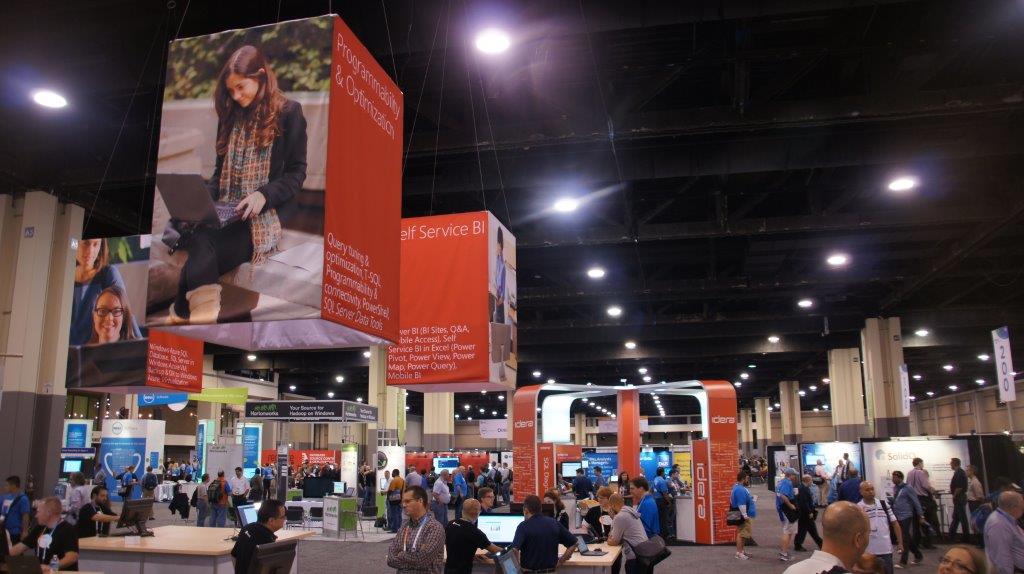
Exhibition at PASS Summit USA 2013
“It is big”
Probably the most common answer will be:
1)
“It is big”, or even “the biggest” – both in terms of number of attendees and offered parallel sessions, tracks and topics.
A good example would be the PASS Summit in the US: the biggest SQL Server conference worldwide. But of course there are even much bigger events outside of the pure SQL Server world…

Attendees Party at PASS Summit 2013 in Charlotte NASCAR Hall of Fame
“it has more attendees than last year.”
2) Almost no conference starts “big”, let alone the “biggest”, so in the beginning, when establishing a conference, it will often be: “it has more attendees than last year.” – This is the first and most obvious sign of a successful progression.
– side note: can a progression be positive without an increase of attendees? – Yes it can: For example the same number of attendees can be a different mixture in terms of job-background which may fit better to the topic of the conference and hence will be happier than last year’s attendees and hopefully spread the word for the follow-up conference which then finally will have more attendees.

Thomas La Rock, the PASS President at that time and Oliver Engels, PASS Chapter Leader at that time of German PASS at SQL Konferenz 2014 – the 10th anniversary of PASS Germany
“Your sponsors are your partners.”
Also, do not forget the sponsors who are highly dependent on the right mix of people – and not the pure numbers.
Having the right sponsors (by making them happy) will give you more flexibility in the whole setup from location, catering, speaker-invites and “goodies”. If you are reading this in preparation of a conference, bear this in mind.
Your sponsors are your partners.
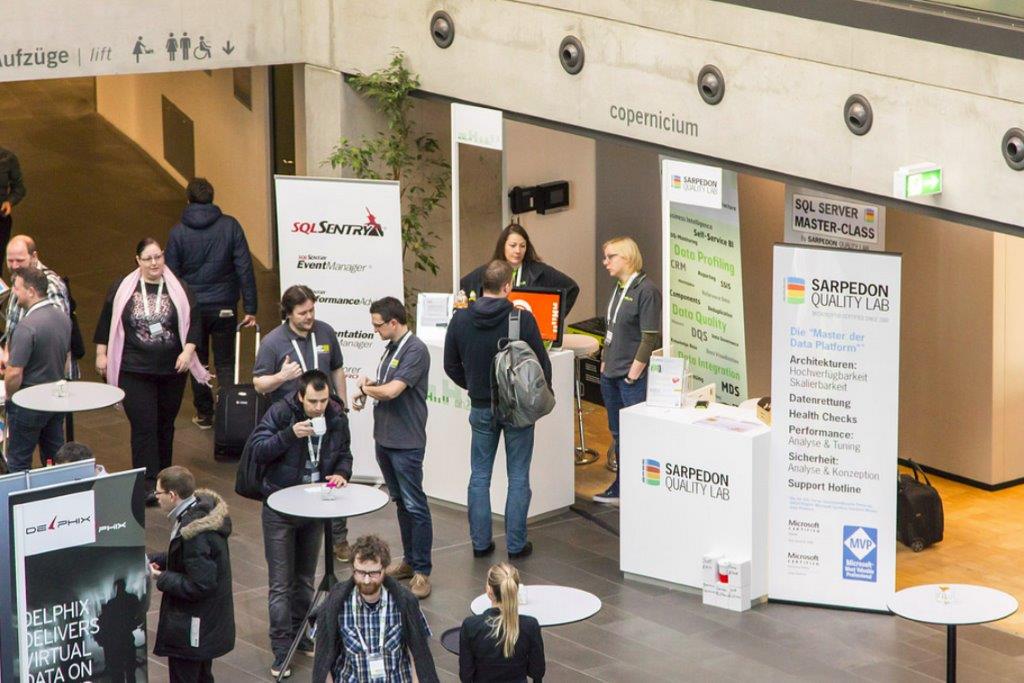
Sarpedon Quality Lab® Sponsor booth at SQL Konferenz 2016
“community conferences are often very happy with a break even.”
3)
It can also be: “it generates a good profit.” Actually very often it will be: “it does generate profit.” – Rather than a loss. And this happens more often than you may think.
Why would a conference make a loss and still be repeated you would ask yourself?
In fact community conferences are often very happy with a break even as the main interest is to just serve the community and not the Profit.
For commercial conferences the reasons may be a bit different.
That brings me to the other options:
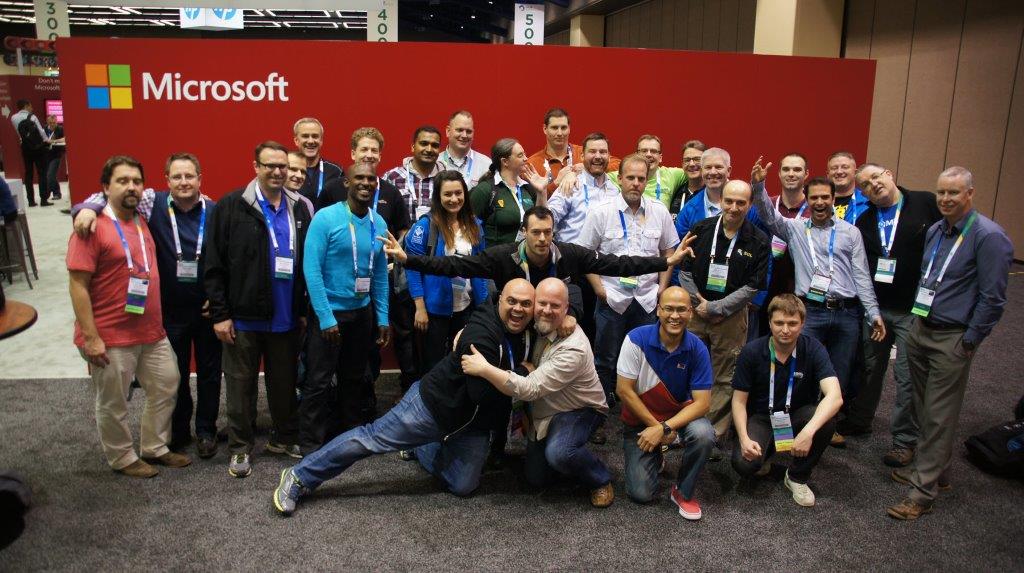
The MCMs at the PASS Summit 2014
“famousness leads to more Publicity”
4) The conference may not create profit, but, simply put “famousness”. Famousness that leads to more publicity. And this alone can be worth the effort for both a commercial as well as a non-profit driven conference.
What kind of fame could that be other than being “the greatest”?
A conference can be known for:
- “The best party” – take undefeated SQLBits in the UK with its ever changing theme-parties.
- “The cool(est) location” If the host-city is already famous, it helps a lot – if you pick a location that is somewhat typical or representative for the city. Some examples would be: SQL Saturday Cambridge, SQL Saturday Malaysia/Kuala Lumpur – in the famous Petronas towers, SQL Saturday Singapore – overlooking the famous Marina Bay and many others. Oh, and SQLBits again changes the host-city every year, making it a principle to show the variety of the country to its attendees and speakers.
- “The most famous speakers” – here the simple rule is (usually): the bigger the conference, the more attracting to world-renowned speakers. Commercially-driven conferences can gain an advantage over other similarly sized ones here though, as they can provide a fee for speakers. If you are unsure start by looking for speakers that have been awarded MVP (usually a sign of a lot of interaction with public, which is exactly what a conference is about) and MCM or MCSM certified professionals (a good indicator of practical experience).
- “Big(gest) choice of sessions” – the greater the audience you want to attract, the broader the range of topics should be. And nowadays everything is somewhat connected anyways, so even an administrator can be interested in certain BI or even Data Science topics. Besides topics also the level of the sessions is important for a bigger audience – from beginner level to advanced level.
- “Cool prices and goodies” – At most conferences attendees have a chance to collect some goodies or even win high-valued prices. I personally have never consciously seen this being advertised specifically though. To what extent this influences attendees to come back I have no clue.
- This one is more speaker-centric: a conference can be known among speakers for “being a great host” – by providing a special program for speakers. For example SQLSaturday Portugal (the first SQL Saturday outside US btw), is known for a superb crew of volunteers that even gave us a special tour to some famous locations around Lisbon – “private sightseeing tour”. At SQL Gulf we were invited to a traditional Saudi Arabian Dinner – before the self-made “sightseeing-tour”. Others bring you to traditional restaurants and so on and so on. In this area one can be very creative. But locality certainly does help.
“Having programmers and even managers at Microsoft/another vendor at location.” This slightly clumsy point is referring to the extra value that a conference can provide, when the actual programmers, program managers etc. from the targeted software are right at the conference. For most attendees this is the only opportunity to ever meet the people behind the product. The PASS Summit in the US is known for that. The close proximity to Redmond makes it possible. For other conferences it is much harder, but still quite a few times you can see some famous people coming from the headquarters. While size of the conference helps, having a strong connection with Microsoft definitely does help a lot if you are an organizer.
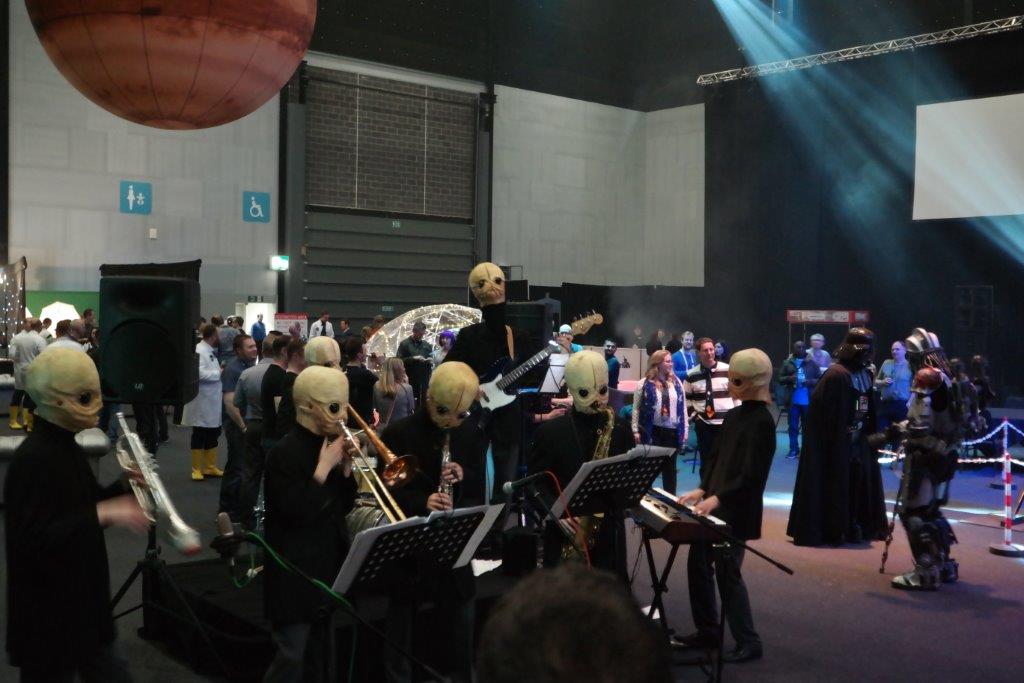
„Space Party“ at SQL Bits 2016 – check out the dancing Darth Vader in the background 😀
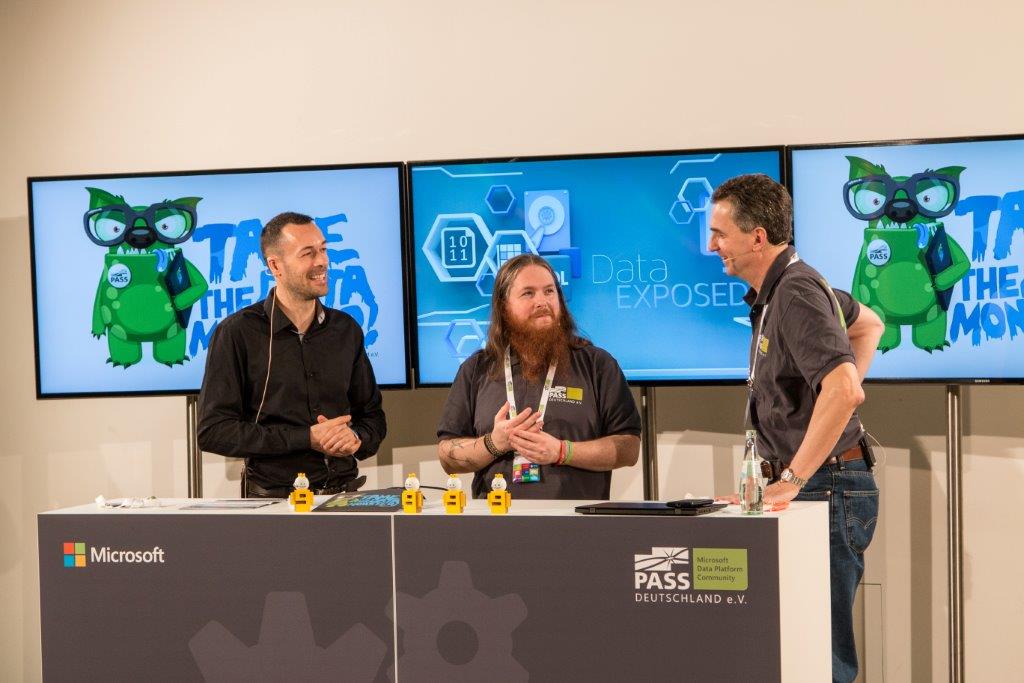
Video shooting at SQL Konferenz 2015 with Joachim Hammer, Head of the Security-Team for relational Engines from Redmond (right), Tobiasz Koprowski from UK (middle) and myself – Video available at Channel 9: “Let’s Talk SQL Server 2016 Security”
“volunteers are key”
5)
And yet there is more. It is something that is not measurable in numbers or can be put in simple words: I will call it “atmosphere” in an attempt to give it a simple descriptive name. It consists of the certain spirit that you feel at the conference. How the people interact, how attendees approach speakers and vice versa. It is hard to describe, but when you have been at several conferences you will sense the difference. Consequently this is also the aspect that can be influenced the least by an organizer. At least this is my feeling. By my observation the relative amount of volunteers are an indicator of a highly positive atmosphere. So maybe I should say: “volunteers are key” to a successful conference.
An ambitious crew of positive-thinking crew that puts its heart in the work for the conference can make a huge difference and give the conference the right impulse towards a successful conference with attendees and speakers wanting to come back.
And until someone proves me wrong I will leave this as a thesis 🙂
– How do you find volunteers? Well, hopefully they will find you. 😉
Besides obviously your local user groups it can help to talk to your local university’s technology/IT information department.
Small side note: As a university dropout (Japanese & British studies, for those who are curious – computer science, at least in terms of substance, was no good back then…) I would have never imagined to ever be giving presentations in a university auditorium. Yet this is exactly what I did a couple of years ago at SQLSaturday Rheinland/Germany at the Bonn-Rhein-Sieg University and, only recently, in the framework of SQLGulf, at the Alfaisal University in Riadh.
Unfortunately that is as much as I can say about finding volunteers. During my travels I did realize that there can be huge differences between countries in terms of volunteers. Why that is, is hard to tell and certainly a complex matter. I did find the volunteers outstanding at the SQL Server Geeks Conference in India and also in Portugal in terms of sheer number and positive energy. If you ever make it there, you will know what I mean.

Attendees, Speakers, organizers and volunteers at SQL Server Geeks Conference 2016 in Bangalore, India
Note that I do not include the point: being “the best conference”. As there are so many possibilities to host a great conference, accomplishing all at the same time seems rather impossible.
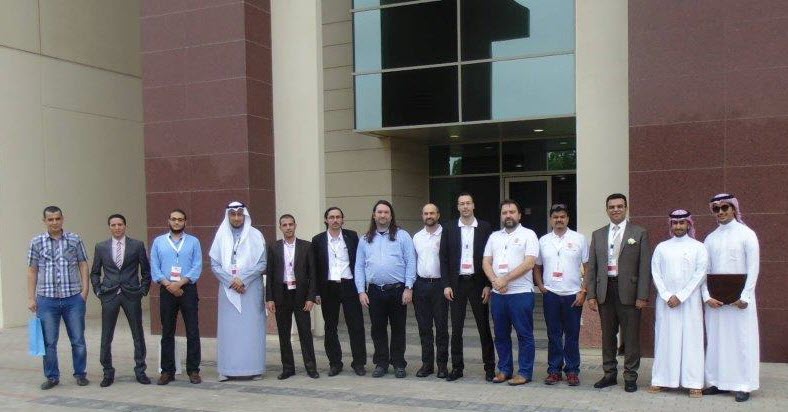
Speakers and Organizers at SQL Gulf 2016 in Riadh, Saudi Arabia
“the most precious thing we all have to offer is time”
Finally: One may ask: “What do I look for as a speaker?”
Now, I cannot deny that being at conferences is also “work”. Even if I love my job and look forward to presenting, I do have to justify it from business aspects as well. Luckily, being the owner of Sarpedon Quality Lab, I allow myself a few exceptions and a relaxed attitude towards conference-attendance. “You gotta love what you do, so why not work also just for the joy of it. At least sometimes…” Therefore, at most community-driven events the reason why I just like to be there is because I love the community, the people around me: organizers, volunteers, co-speakers and attendees. What’s more, there is little that gives such positive energy and boost like an actively interested audience does.
So the answer to the question as to which conferences I prefer would be: the ones with the best atmosphere und the most interactivity with the attendees. After all, the most precious thing we all have to offer is time. And a conference is a great opportunity to spend it with many people with similar interests.

View from the Microsoft office Singapore, the Location of SQLSaturday Singapore 2016
From an attendee’s point of view things like “many sessions to choose”, “well known top experts to meet”, “being able to interact with speakers and get answers to technical questions”, “connecting with fellow professionals” and “getting in touch with interesting companies (potentially new employers)” will probably be among the most important reasons.

View from the Microsoft office Kuala Lumpur, the Location of SQLSaturday Malaysia 2015
Disclaimer: If I have not mentioned your conference, do not take it as a negative. I have simply been at too many (over 50 conferences in more than 12 countries) and on the other hand certainly not enough to make a scientific statement. I tried to give only a few examples for certain criteria. I am not doing an overall “rating of conferences”.

Alfaisal University in Riadh, the Location of SQL Gulf 2016
Question to my readers:
What do YOU think? Why do you go to conferences, why do you speak at conferences, why do you organize conferences?
I am curious to hear your answers which may be slightly different for each of you.
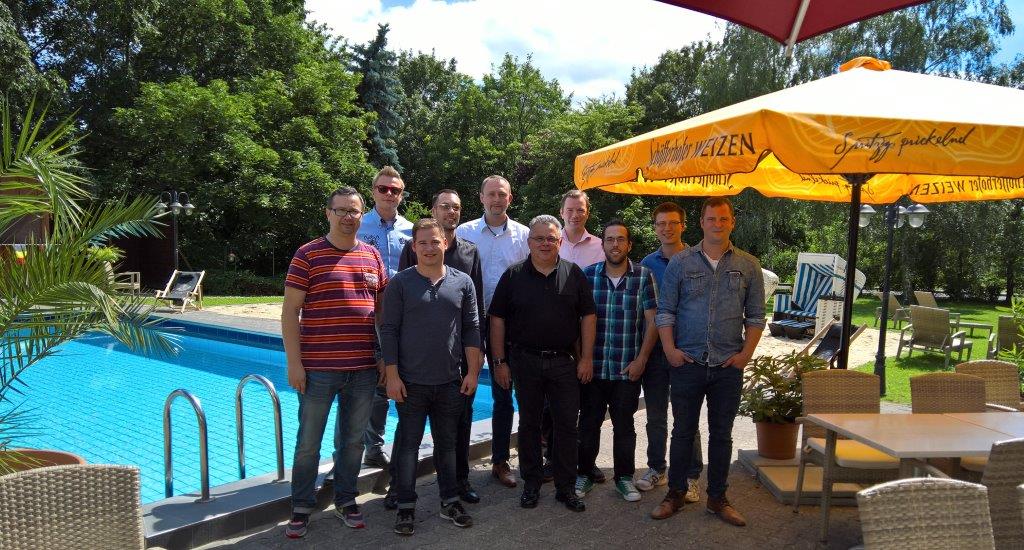
Attendees at German SQL Server Master-Class “High Availability” 2015
Cu next conference
Andreas
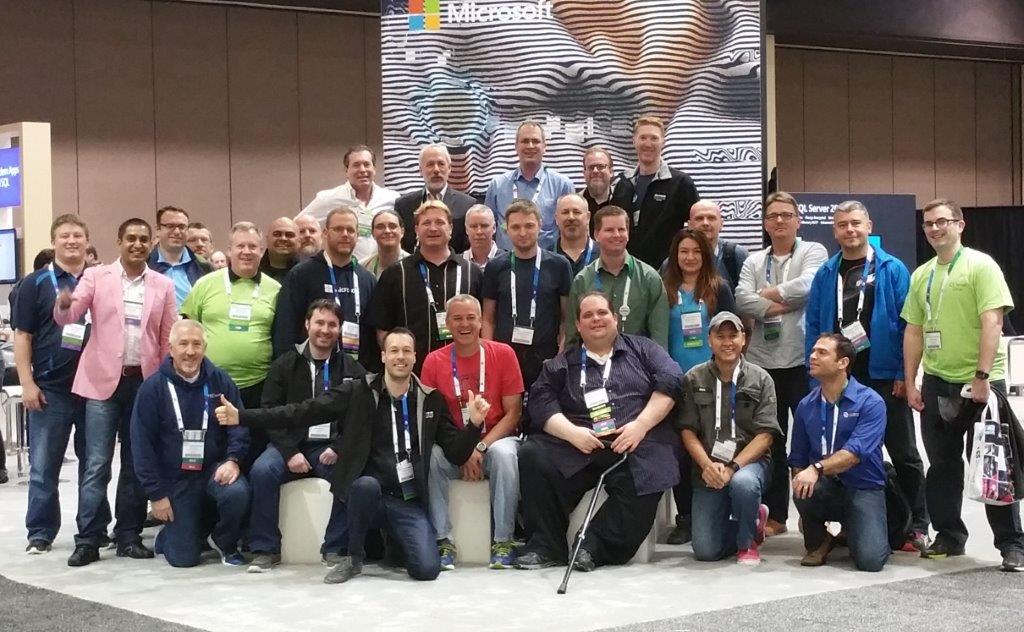
The MCMs at the PASS Summit 2015



Leave a Reply
Want to join the discussion?Feel free to contribute!